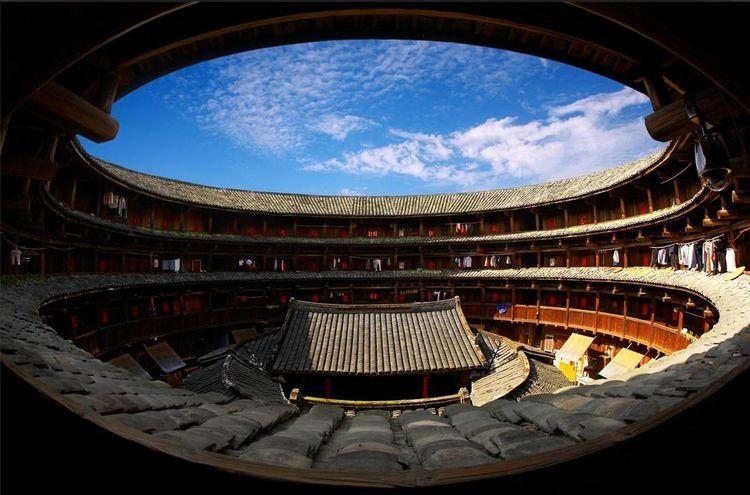Gaobei Tulou Cluster
Representative Tulou: Chengqi Lou is known as the 'King of Tulou', the largest Tulou developed into a scenic spot. 'Four stories high, four circles, four hundred rooms up and down; middle circle, middle circle, middle circle, middle circle, enduring three hundred years of vicissitudes.' It is the first Tulou to appear on a stamp, and also the first Fujian residential building to appear on the 1986 'Chinese Residential Buildings' stamp. The entire building has a total of 400 rooms, and at its peak, 800 people lived in the same building. The unique architectural style and way of life of the Tulou make it a World Cultural Heritage site.
Hongkeng Tulou Cluster
Generations of Tulou: Zhencheng Lou, Kuiju Lou, Rusheng Lou, Fuyu Lou, and Hongkeng Tulou have become famous due to the exquisite Zhencheng Lou, known as the 'Prince of Tulou', and a visit by Chairman Hu during a certain year's Spring Festival. These have made it a popular route for many tourists choosing to visit Tulou. 'Prince of Tulou' Zhencheng Lou: Originally, Tulou were residential buildings for the daily living of residents in the mountainous areas of southwestern Fujian. As families aspired to wealth and prosperity, they naturally wanted to decorate their houses more grandly, and Zhencheng Lou is the most exquisite among them.
Representative Tulou: Jiqing Building, Shanqing Building, Shengqing Building. Chuxi Tulou Cluster, filming location of the TV series 'Going to Nanyang', which is set in the late Qing Dynasty and early Republic of China. The story depicts Hakka people from Tulou going to Nanyang, working hard and starting businesses, and is an epic of Chinese immigration. The Chuxi Tulou Cluster consists of 5 circular Tulous and 31 square Tulous. Among these Tulous, 'Jiqing Building' has only one iron nail in the entire building, relying solely on 72 staircases and nearly 2-meter-thick rammed earth walls, enduring hundreds of years of weathering.
Purchase tickets at the visitor service center to enter the park, take a car to the Tianluokeng upper viewing platform (there is a shuttle bus within the Tianluokeng Tulou Cluster). From here, you can overlook: 1 square building, 3 round buildings, and 1 oval building. People humorously call it 'Four Dishes and One Soup'. This is an iconic landscape of the World Heritage site.
Yunshuiyao
Representative Tulou: Huaiyuan Building, Hegui Building Yunshuiyao Tulou Cluster, became famous due to the movie 'Yunshuiyao'. A thousand-year-old ancient path connects two World Heritage Tulous, Huaiyuan Building and Hegui Building. Along the way, there are babbling streams, waterwheels, and large banyan trees, making it known as the most romantic Tulou. After purchasing a ticket at the entrance of Yunshuiyao Scenic Area, walk about 200 meters to reach 'Noah's Ark' Hegui Building. This is a magical Tulou built on a swamp. Residents live here, and if you curiously jump in the center of the building, the ground trembles, but Hegui Building remains intact and does not collapse.













